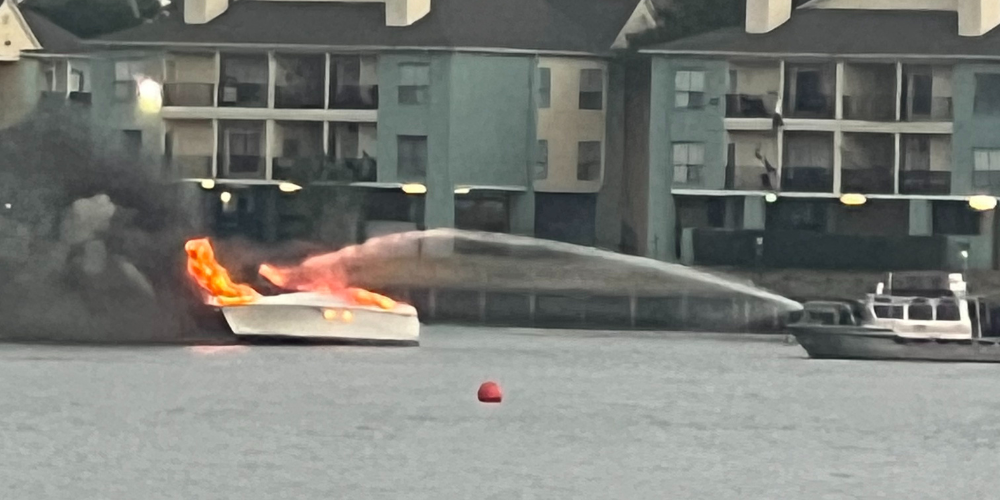My Experience With A Boat Fire With Fire Prevention TIPS for Boat Owners

Life aboard a boat offers a unique blend of serenity and adventure, but it's not without its inherent risks, with fire being the most formidable among them.
During our morning stroll today, a plume of black smoke rising over the Bay caught our attention. Upon closer inspection, the source of the smoke was a boat anchored in Clear Lake, engulfed in flames.
The challenge with such fires, especially when they break out in the middle of the bay, is the accessibility of emergency services. Fire departments require specialized marine vehicles to reach the scene, and every passing moment is crucial. With boat fires, time is a luxury one simply doesn't have.
Boats, by their very nature, are rife with potential fire hazards. The interiors, often adorned with wooden panels, coupled with carpets, mattresses, and other flammable materials, can quickly become a tinderbox if a fire ignites.
Alarmingly, not all boats are equipped with essential safety devices like smoke and CO2 detectors. We've taken precautions by installing alarms in every cabin of our boat, understanding their critical role in early fire detection.
Another overlooked danger is the electrical system, especially on older boats. It's not uncommon for individuals to overload a single outlet with multiple devices. This practice, combined with outdated or frayed wiring that might not meet current safety standards, can be a recipe for disaster.
Having witnessed a range of electrical issues on our own boat, I can't stress enough the importance of regular inspections and upgrades.
I have added some tips to prevent fires on boats:
What causes the biggest boat losses every year?
Fire ranks No. 5 among all boat losses, according to BoatUS Marine Insurance Program claims files. Dig a little deeper, and those claims files also tell the six specific areas that lead to most reported boat fires. Since being forewarned is being forearmed.
Here are the top culprits and some tips on how to avoid them:
Here are some more tips from the Fire Department >>>
Fire Prevention TIPS for Boat Owners
Advice from the Fire Department
-
Understanding Marina Fires:
- Recognize that most fires at marinas originate from individual boats.
- Apply home fire prevention techniques to boats for enhanced safety.
-
Selecting the Right Marina:
- Prioritize marinas with comprehensive fire safety measures.
- Look for features like fire extinguishers, cleanliness, and well-lit areas.
- Ensure clear dock passageways and robust security measures.
- Trust your instincts: if a marina feels unsafe, consider other options.
-
Electrical Safety:
- Opt for marine cord sets and connections approved by Underwriter's Laboratory (UL).
- Avoid connections with visible burn marks or those that don't fit securely.
- Periodically replace cord sets to prevent wear and tear.
- Understand that damaged shore power connections can lead to fires.
- Schedule regular inspections of electrical and fuel systems.
- Consider professional wiring upgrades to support navigational tools and appliances.
- Always turn off electrical devices, especially heaters, when not in use.
-
Smoke Alarms and Fire Extinguishers:
- Install smoke alarms on your boat as they are crucial for safety.
- Equip your boat with a U.S.C.G. approved fire extinguisher.
- Familiarize yourself with its operation and ensure it's accessible.
- Position the extinguisher close to an exit for easy access during emergencies.
-
Dock Maintenance:
- Maintain a clutter-free dock environment.
- Avoid leaving items like engine components, tools, or other equipment on the dock.
-
Handling Oily Rags:
- Store oily rags in a sealed metal container.
- Avoid wrapping them in regular bags, as chemical reactions can cause them to heat up and ignite.
Handy Information Links:
http://www.boatingmag.com/how-to/preventing-boat-fire
http://www.boatsafe.com/nauticalknowhow/021598tip2.htm
http://www.boatsafe.com/nauticalknowhow/022298tip2.htm

Veronica Jeans
eCommerce Strategist | Shopify Expert | 7-Figure Business Coach
I have integrated my extensive knowledge in the field of eCommerce and Shopify, along with my international financial expertise, to offer up a playbook for generating income online.

